Fed Up With (School) Lunch – The Book
This post may contain affiliate links.
I met Sarah Wu when she was Mrs. Q., the anonymous teacher blogger, chronicling her year-long experience eating school lunch. Since then, she’s officially come out and published a book which I know you’ll want to read.
“I know that at some point in your life you ate hot lunch at school. . . I have news for you: School lunch has gotten worse. Much worse.” (p.22)
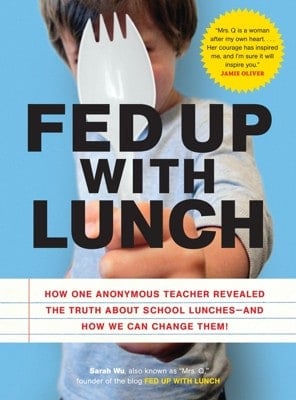 Fed Up With Lunch, the book based on the blog, shows Wu’s viewpoint by sharing her history with food and business from childhood to adulthood. Throughout the book Wu shares what happened to the quiet teacher that turned her into an advocate for better school lunches. Not only that, we learn how both her health and her son’s health were affected by the food and what they did about it.
Fed Up With Lunch, the book based on the blog, shows Wu’s viewpoint by sharing her history with food and business from childhood to adulthood. Throughout the book Wu shares what happened to the quiet teacher that turned her into an advocate for better school lunches. Not only that, we learn how both her health and her son’s health were affected by the food and what they did about it.
Food and Learning Linked
If you’ve ever done a detox, or as I have, stopped eating gluten, you know that food affects everything in your body. It changes your energy – and makes you feel either good or bad.
Food is a drug – either good medicine or health-killer.
In school, learning is tied to having a high quality education with good teachers for sure but what Wu (and I) want parents to understand is that a child’s learning ability is also very much tied to nutrition. “Studies have shown that children who suffer from poor nutrition during the brain’s most formative years score much lower on tests for vocabulary, reading comprehension, arithmetic, and general knowledge.” (p.25) It’s common sense though – we know this don’t we? And, I’ve read some good research about better focus on a gluten free diet which is helpful for many kids, especially kids with ADHD.
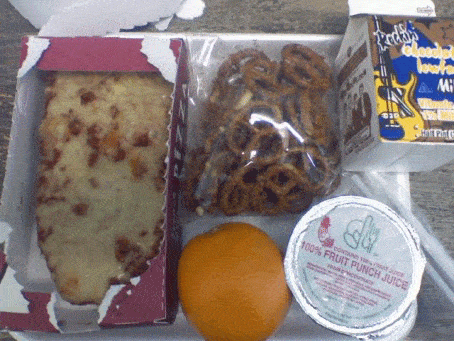
BE Scared. I Am . . .
Because Fed Up With Lunch taught me some new things . . . that are scary!
Do you know that the school lunch program has no ties with the Department of Education???? (Only the US Department of Agriculture.)
Do you know that there isn’t full-disclosure on the food ingredients in a school lunch?
Do you know that more than 90% of food brought into cafeterias is frozen? (and therefore contain ingredient fillers that aren’t good for us?)
Do you know that school districts usually serve fruit juice to fill the daily requirement for fruit? But without the fiber of the actual fruit, it’s just sugar! Sugar + kids + math = ?
Do you know that the chocolate milk contains high-fructose corn syrup? (Now this, my friends, is practically a poison, no question about it.)
Do you know that children eating school lunches will affect YOU?
- Kids in poverty often don’t eat much else than what they get for free at school. Consider the effects of poor nutrition from the school lunches these kids eat: obesity, heart disease, diabetes, poor learning, drop outs, . . .
- We are sending a message to our children that we could care less about their health and learning when we feed them crap.
Who Will Help Our Kids?
You.
Wu ends the book with LOTS of ways for you to help in small ways and big ways for you and YOUR KIDS! (I love this section!!)
I believe that we all share in the responsibility of making this world a better place but even more than that, I believe we MUST speak for children who have no voice — we MUST be the voice of the children or we fail them as a community.
5 Ways Parent Can Improve School Lunch is an article by Wu on Babble that will give you some ideas for right now. But you still need this book – and you should pay it forward. Tell a friend, spread the word. It’s how change happens.
“Never doubt that a small group of thoughtful committed citizens can change the world. Indeed, it’s the only thing that ever has.” – Margaret Mead
Interview with Sarah Wu on School Library Journal
Now, I ask you, WHAT WILL YOU DO?
(Even if your kids don’t eat school lunches!)
(I know, caps are screaming – are you hearing me? I’m getting worked up!!!)
You Might Also Like . . .
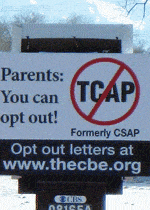 Standardized Tests – Your Rights & How Your Child Is Affected
Standardized Tests – Your Rights & How Your Child Is Affected

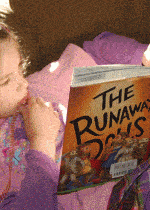



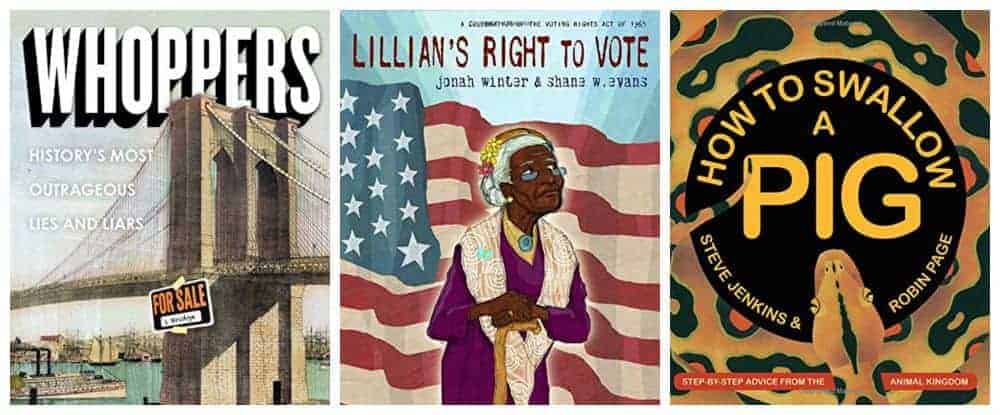
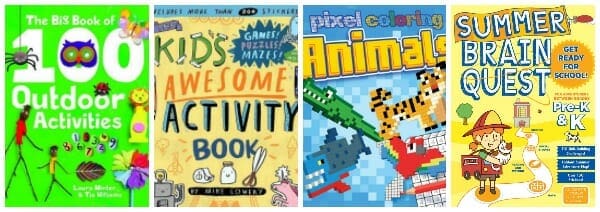


School lunch is always an issue that is most concerned by parents because it also directly affects the child’s development. They collect the food monthly (or sell food) at quite high prices but the quality is not as guaranteed as promised!
A few points I’d like to comment on:
High fructose corn syrup. Poison? Really? I think that’s a little, no I mean, really extreme!
School lunches are tied to The department of Agriculture. Is that a bad thing?
The part where you say: “Consider the effects of poor nutrition from the school lunches these kids eat: obesity, heart disease, diabetes, poor learning, drop outs, . . .” I have to say, it’s not the school lunches that make children obese. It’s the extra stuff they eat when they get home, it’s the lack of exercise, etc. It’s not the four little squares barely filled with food on their lunch trays that contribute to heart disease. With that said, I totally don’t agree with schools offering extras – they need to just keep to what’s on the tray. If the child is in poverty, and all their eating is this one meal, then it should have plenty of fat to sustain them for long periods of time. Kids are at school for 6.5 hours!
And if the food wasn’t frozen, I don’t know how they could manage to keep it fresh. I’d rather it be frozen than wasted because they couldn’t use it soon enough.
Feeding them crap? Really? (again) Pretty strong words. Have you actually seen a school lunch in person? The proportions are appropriate and moderation is key!
My kids actually don’t buy their lunches, but I’ve been a lunch helper plenty of times to see that what the children are fed is not nearly as bad as what you’re mentioning here.
Sure, it’s not homemade soup, but it’s a very well rounded meal for the price they have to keep it affordable. The school lunches aren’t the problem. People need to watch out for what the children are eating at home and be sure to lead an active lifestyle.
Thank you.
Melissa, this is so good of you to spread this awareness. High fructose corn syrup is so very harmful.
My daughter is home schooled, but I am sure school lunches are just awful. Seeing those pictures makes me want to cringe.
Children deserve better food!
I just wanted to say that leading an active lifestyle is great, but that does not compensate for or even make up for the harmful food that people consume. Children just should not be eating food that is ridden with preservatives, hydrogenated oils, artificial flavorings and colors, etc! School lunches should be healthier.
I even read an article once about a school that was growing a garden and taking an initiative to feed the children better. Now that’s what I want to see! 🙂
Hi Molly,
There is wide variation among school districts –and even individual schools. It’s very possible that your children’s school offers great school lunches and, if so, I applaud them.
Many schools, including mine, offers lunches that fulfill the regulations, but they aren’t good in both taste and nutrition. Ingredients matter. Also, the school is modeling unhealthy food a lot of the time. At least in my situation, we’re talking about students living in poverty looking to the school for their best meal of the day. I think many schools can do better.
My mom knew, even when I was a child, that what she could make was better than what I would get in the school cafeteria. She packed my lunch every day…homemade soups, fruit, cottage cheese. Her thoughtful care in making what we ate every day was passed on to how I feed our own children—with care as she did.
I think it is wonderful that Mrs Q, Sara Wu, is taking an active role in encouraging others to change what is served in cafeterias. Many children must eat what is served because they receive the meals with financial assistance, and many working moms aren’t able to pack lunches every day. A change to make school lunches healthier and more natural would be a good, good thing.
Yikes. I had no idea! My kids order school lunches and they are not good nor that healthy! Thanks for the heads up!
Thank so much for reviewing my book Melissa — I really appreciate it! It’s amazing what you learn about school lunch when you dig a little deeper. I learned so much when I ate the food. It was along year, but one that has changed my life for the better and hopefully helped families and kids learn about what they can do to change things.